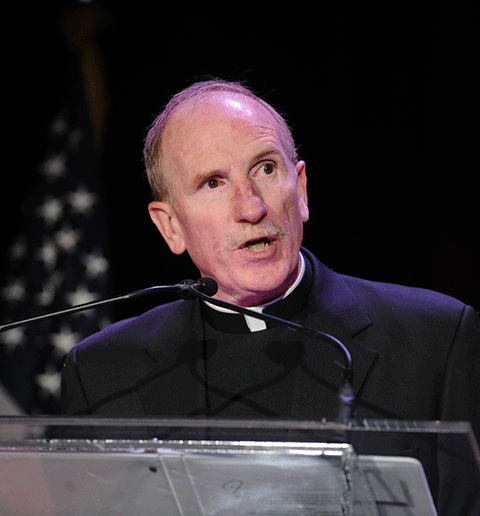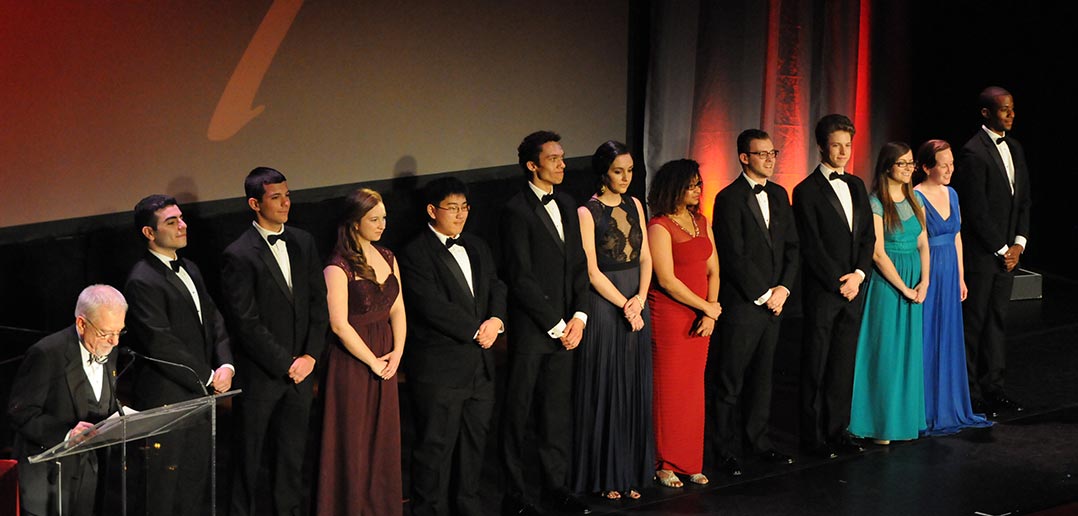Like a true harbinger of spring, the 14th annual Fordham Founder’s Dinner arrived at the Waldorf Astoria on March 23, bringing with it crisp weather and more than $2.1 million for the Founder’s Undergraduate Scholarship Fund.
The perennial event brings out the University’s stalwart supporters and celebrates student scholars.
“I would not be standing here tonight had it not been for your generosity and your belief in me,” said senior theater student Anna Abowd, who spoke on behalf of the 16 Founder’s Scholarship recipients. “I have discovered more about myself and what I love through Fordham’s environment, spirit, and people—and will hold onto and share this love as I go out into the world.”

In addition to cheering on the scholars, the University honored four of its most accomplished, loyal supporters with the Fordham Founder’s Award: Edward M. Stroz, GABELLI ’79, and Sally Spooner, and William J. Toppeta, Esq., FCRH ’70, PAR, and Debra J. Toppeta, PAR. Both couples have established scholarships and faculty chairs at Fordham.
Joseph M. McShane, SJ, president of Fordham, said Stroz and Spooner embody the Jesuit ideal of being “men and women for others,” noting that Stroz’s career as an FBI agent and Spooner’s work for animal welfare are about “protecting and serving others.”
Stroz said that after he left the FBI to establish Stroz Friedberg, a global digital risk management company, he sought to “carry out the mission.”
“With the time that I spent in public service for 16 years, and when I started a company, I found that I did not need to compromise the values [I learned at Fordham] or change things in any way.”
He recalled that during his time at the University most of the students were commuters, like himself.
“My head was down low,” he said. “I wasn’t a particularly good student. But I loved the fact that I could get the quality education that was both liberal and something practical.”
He said he continues to draw from lessons he learned both “inside and outside the classroom.”
“There’s a real palpable feeling when you talk to people [from Fordham], there’s a comfort level that you feel,” he said. “Fordham is a school with a soul.”
Father McShane then introduced Bill Toppeta, a Fordham trustee and former president of MetLife International, and his wife, Debra Toppeta, publisher of Woman Around Town, an award-winning website covering New York City and Washington, D.C.
Bill Toppeta said that while Archbishop John Hughes may have founded the University in 1841, the lion’s share of the credit goes to the Jesuits, the “true founders,” who came to the University five years later and have understood the value of global education since the 16th century. He recalled a meeting of international business leaders who were congratulating themselves on establishing business in India and China.
“But St. Francis Xavier established missions in India, China, and Japan in 1540, before the Jesuit order was even established,” he said. “Now that is real long-term global vision.”
He said that Fordham has long been home to immigrants and first-generation Americans, including his father, who was born in Italy and came to Fordham in 1940. His mother was among a “handful of women” to graduate from the Law School in 1946. In 2013, she presented her granddaughter Kristin with her Fordham Law diploma.
“So our family has been part of the Fordham family for seventy-five years,” he said. “I don’t tell you this story because we are unique—in fact, on the contrary, I tell you because we are typical of thousands of Fordham families.”
He said today Fordham students hail from Africa, Latin America, and Southeast Asia, as well as from the United States.
“Many of those students are making a transition—regardless of their place of origin, these immigrants share a common humanity and a common goal,” he said. “It is the American dream and it is alive and well at Fordham.”
(story continues below)
Following two consecutive Founder’s Dinners that were “giddy” and “wildly joyous” events, Father McShane said that the evening could almost be a billed as a “return to business as usual.” He reminded the crowd that in 2013 the event took place a mere five days after the election of Pope Francis. And last year’s dinner marked the close of Excelsior, the University’s successful $540 million capital campaign, and became a “boffo affair, complete with conga lines.”
But the University’s business, he said, is anything but “business as usual.”
“I believe that nothing merely usual, commonplace, or ordinary goes on at Fordham because our mission is anything but commonplace or ordinary. Far from it. Fordham’s mission is quite simply extraordinary. Noble, sacred, transformative.”
He listed some of the past year’s accomplishments: four athletic championships—in football, women’s basketball, softball, and men’s soccer; the opening of McKeon Hall and the dedication of the new law school building; the unification of the undergraduate and graduate business programs as the Gabelli School of Business; and a bevy of scholarships earned by students, including a Truman, a Gates-Cambridge, and a harvest of Fulbrights.
“And, by the way, over the weekend, we learned that we have already won seven new Fulbrights this year,” he said, noting that the University has been a top producer of Fulbright recipients for three years running.
He said much of the success was accomplished because Fordham students are “cared for, watched out for, and fretted over.” He concluded by noting that students in the past academic year gave more than 1 million hours to service projects both at home and abroad.
“And so I ask you,” he said, “is this mere business as usual? This is business as miracle!”
Check out the evening on Storify.

